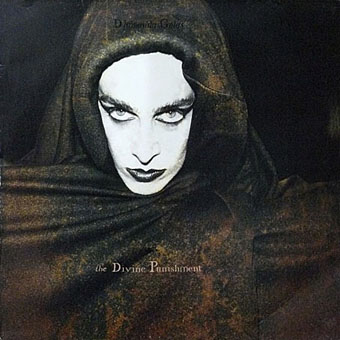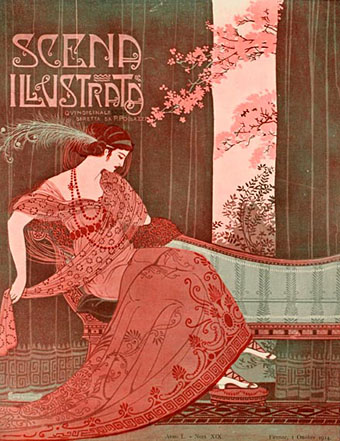The Divine Punishment (1986) by Diamanda Galás. Design by Paul White/Me Company.
What the Catholic League and certain members of the House presumably wish to remove from their consciousness is thirty years of death sentences handed down to their parishioners and citizenry, who were told not to wear condoms, and the mistreatment of those stigmatized as miscreants and sinners by their viral status and/or homosexuality and/or status as drug addicts.
• Diamanda Galás responds in her usual forthright manner to the censoring of David Wojnarowicz’s film (and her music which accompanied it) by the Catholic League and members of the House of Representatives earlier this week. Related: Demonstrators gather to protest removal of Wojnarowicz art from NPG | Is the censored David Wojnarowicz video really ‘anti-Christian’? | Vengeance is hers: a conversation with Diamanda Galás.
• Update: Hide/Seek: Too shocking for America. One of the exhibition curators speaks out against the censorship.
“Their attitude is: ‘Next time you think of writing about sex, don’t,'” said Susie Bright, who was the editor of the Best American Erotica anthology series for 15 years. “I can’t think of any other fundamental human experience that writers would be encouraged to keep to themselves.” Melissa Katsoulis, a literary reviewer for the Times of London, certainly seemed to conform to Bright’s impression when asked to comment on the award by the BBC: “Sex is a subject best avoided altogether,” she said. “If I was writing a novel, I wouldn’t attempt to write it except in the most Victorian and prim way, because it’s awful. It’s a cliché, but the moments of genuine frisson in books are when hardly anything happens.” Speak for yourself, missy.
• Laura Miller dissing the Literary Review‘s annual Bad Sex Award. Good to find more voices being raised against this drivel and the admission of failure which it implies.
• The latest offbeat experiment from filmmaker David Lynch: pop singles. He gets crazy with the vocoder here. Related: David Lynch talks new music projects.
Scena Illustrata (1914). Cover by Ezio Anichini (?). Via this set of magazine covers from 1880–1920.
• Tumblrs of the week: Heart Killer and Pretty Pictures from the Paleo-Future Blog.
• The Big Picture’s 2010 Hubble Space Telescope Advent Calendar.
• National Geographic‘s Best Underwater Views of 2010.
• A seasonal gift from a famous Northampton resident.
• Paris versus New York: A Tally of Two Cities.
• This is your browser on drugs.
• Double-Barrel Prayer (1988) by Diamanda Galás, with a video directed by the late Peter Christopherson.



There are a lot of people in this country whose eyelids I would like staple open while they were chained to a chair, hence making the act of forcing them to read honest testimonials like Ms. Galas’s for ‘once’ in their pitiful, naive lives a somewhat simpler one. I’ve never regarded myself as any kind of humanitarian, not that this makes me proud at all, and neither are any of the hypocrits to whom Galas’s writing is directed, and they’ve no justifiable reason for their pride. She is proud though, Galas that is, and deservingly so, as well as more of a humanitarian than any of them.
I simply can’t understand, in no dictionary I’ve ever read through have words like ‘samaritan’ been followed by a definition that reads roughly like; he or she who knowingly and willingly turns a blind eye to unpleasant truths glaring them in the face and reacting with the disrespect and denial of a spoiled child when confronted about such things.
Apparently if some of these good christians collaborated on their own culture-specific Thesaurus, then words like ‘humanitarian’ and ‘diplomat’ would occupy the same space as ‘fucking coward’.
Sex in fiction. The Bad Sex Award is cheap, because there is so much bad writing about sex. It is a poorly named award: surely the point is–or should be–that the writing is bad, not that the sex is bad.
Heterosexuality in a sexist society: the men hate the women, and the women have every reason to hate the men–what are they doing in bed together?–, but few people want to come out and say this, so there is a lot of awkward, embarrassed, and just plain dishonest writing. Too simple an explanation?
People often call for unembarrassed, pro-sex, erotic writing, as if this were the only alternative to the usual “bad sex”. Surely, anything honest, insightful, and well-written is to be applauded, and that needn’t be erotic, pro-sex propaganda: a good writing about sex award needn’t be the Good Sex Award, surely.
In the meantime, we have Chip Delany: hooray!
That Galas response makes me proud to be Greek. As for Bill Donohue, he and his ilk are only worthy of contempt, revulsion and a permanent slot as a South Park joke.
However, I expected more from the Smithsonian than this cowardly approach. If they didn’t have the spine to defend their choice, they shouldn’t have exhibite the piece to begin with.
Anyway, more publicity for stuff that scares the fundamentalists. Always a good thing.
Wiley: The people who started all this were one of those conservative groups who trawl the web stirring up trouble. As I noted earlier there was little mention of the video work in previews of the show so they must have gone out of their way to find something to be offended about. People like that are narrow-minded enough to easily ignore anything Diamanda Galás would say. I’m really pleased she had her say, however, she’s a powerful advocate and her presence makes up for the voiceless artist who’s at the centre of all this.
Dimitris: The exhibition curators are just as disappointed. Reading about their hopes for the show makes the whole episode all the more galling.